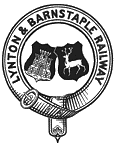
Blackmoor Gate railway station
Encyclopedia

Blackmoor Gate
Blackmoor Gate, the western gateway to Exmoor National Park, sits on the watershed between tributaries of the rivers Yeo and Heddon nearly 305m above sea level. It has long been a crossing of tracks – an ancient ridgeway following the former moorland ridge from the heights of Exmoor down to the...
at the western boundary of Exmoor National Park, was a station on the Lynton and Barnstaple Railway
Lynton and Barnstaple Railway
The Lynton & Barnstaple Railway opened as an independent railway in May 1898. It was a single track narrow gauge railway slightly over long running through the rugged and picturesque area bordering Exmoor in North Devon, England. Although opened after the 1896 Light Railways Act came into force,...
, a narrow gauge line that ran through Exmoor
Exmoor
Exmoor is an area of hilly open moorland in west Somerset and north Devon in South West England, named after the main river that flows out of the district, the River Exe. The moor has given its name to a National Park, which includes the Brendon Hills, the East Lyn Valley, the Vale of Porlock and ...
from Barnstaple
Barnstaple
Barnstaple is a town and civil parish in the local government district of North Devon in the county of Devon, England, UK. It lies west southwest of Bristol, north of Plymouth and northwest of the county town of Exeter. The old spelling Barnstable is now obsolete.It is the main town of the...
to Lynton
Lynton
Lynton is a small town in Devon, England. It lies on the northern edge of Exmoor and is located at the top of a gorge above Lynmouth, to which it is connected by the Lynton and Lynmouth Cliff Railway...
and Lynmouth
Lynmouth
Lynmouth is a village in Devon, England, on the north edge of Exmoor.The village straddles the confluence of the West Lyn and East Lyn rivers, in a gorge below Lynton, to which it is connected by the Lynton and Lynmouth Cliff Railway....
in North Devon
Devon
Devon is a large county in southwestern England. The county is sometimes referred to as Devonshire, although the term is rarely used inside the county itself as the county has never been officially "shired", it often indicates a traditional or historical context.The county shares borders with...
. The station opened with the line on 11 May 1898, and closed with it after service on 29 September 1935. From 1923 until closure, the line was operated by the Southern Railway
Southern Railway (Great Britain)
The Southern Railway was a British railway company established in the 1923 Grouping. It linked London with the Channel ports, South West England, South coast resorts and Kent...
.
At a crossroads and coaching stage, the station was provided with a range of stables, since converted to human habitation. The station building has been extended over the trackbed, in a sympathetic style, and is now a licensed restaurant. The bridge under the crossroads has been filled in.
A large livestock market was established across the road from the station, and it was originally envisaged by the promoters of the L&B that this would generate a healthy income. North Devon farmers, however, preferred to drive their cattle to market across country, than pay to have them shipped by rail.

